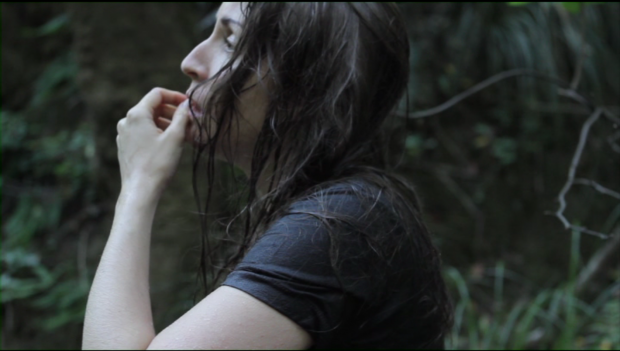One of Filmmaker Magazine’s 25 New Faces of 2013, Josephine Decker makes films, performances, and friends in strange places. Her newest two films, Butter on the Latch and Thou Wast Mild and Lovely, both premiered at the Berlinale Forum 2014. (Josephine Decker’s official website)
Butter on the Latch and Thou Wast Mild and Lovely will both play at the London Film Festival on October 9 and 10.
W&H: Please give us your description of Butter on the Latch.
JD: Butter on the Latch is a doc-fiction hybrid exploring the slow and then explosive fracturing of a female friendship at the real-life Balkan Camp, a place where Americans learn traditional Balkan folk songs and dances in the haunting woodlands of Mendocino, California.
W&H: What drew you to the story of Butter on the Latch?
JD: For me, a lot of a film is about tone and mood — I love eerie and creepy spaces. Butter on the Latch was really inspired by my time standing in the forest at Balkan Camp and hearing wild, ominous tones float towards me through the trees. That space — a traditional Balkan folk song and dance camp in the deep woods of Mendocino, California — created that film in some way. We improvised all the dialogue, so the script is just a bunch of genius actors speaking their momentary truths in a really stunning place.
W&H: Please give us your description of Thou Wast Mild and Lovely.
JD: Mild and Lovely is an Appalachian murder ballad-turned-film — poetic then romantic then sexy then deadly then — transcendent! The film follows Sarah and her father, who slowly discover that the man they hired for summer work on their farm has been hiding.
W&H: What drew you to the story of Thou Wast Mild and Lovely?
JD: Mild and Lovely emerged out of a visceral interest in Steinbeck’s East of Eden and its main character ,Kate. She is so, so, so evil! So for the film, I explored what it means to manipulate and seduce and then… love? What happens when you get everything you want out of someone? And I really let my inner poet flow.
When Joe Swanberg showed up to shoot the film (he plays Akin), he was like, “Well, Josephine wrote an 88-page poem we’re going to somehow turn into a movie!” And the truth is, I love that we did it that way. I wrote that script during a very intense time in a break-up in a very intense place (a tiny, inescapable 10-person artist residency in the middle of nowhere with a lot of sexual tension and miscommunication among its participants, but enough silence in the mornings to write write write!), so I was channeling a ferocity in the characters and in myself, and I deliberately tried to leave some images in the film “open.”
Ashley (my DP) and I had a lot of fun “interpreting” the words in the script. It’s a gift to not always know how you can represent the feelings and images on the page. It forces you to be very, very creative, and open, and intuitive, and just give in.
W&H: What was the biggest challenge in making the films?
JD: The biggest challenge for me in every film is believing that what I have to say is important enough to have lots of people collaborate to make a whole movie. I work on this belief every day. And try to remind myself that I also teach, and I’m constantly telling young people that their voices and stories are important. Making a movie is such a large-scale, intense operation that imagining that you “deserve” to be making it is — well, complex.
W&H: What do you want people to think about when they are leaving the theatre?
JD: I don’t want them to think at all. I hope audiences will walk out of that dark, bristling theater filled with surprise and wonder and curiosity in the midst of an experience absolutely new.
W&H: What advice do you have for other female directors?
JD: Make movies for as little money as possible with resources you and your friends can bring to the production, and you can do anything you want! I sat around trying to get one million dollars for my first film for years! And I feel super lucky to have worked with Joe Swanberg and gotten to see that movies can be made for NOTHING — with just three people in a room. In fact, sometimes, the best movies are. You don’t have to bend your vision much when your feature costs $10,000.
W&H: What’s the biggest misconception about you and your work?
JD: I am grateful for misconceptions, because it means that an audience is interpreting things as they please. The films I find boring are the ones that have no space for the audience’s misconceptions.
W&H: How did you get your film funded?
JD: For Mild and Lovely, we used a combination of crowd-sourcing, independent financiers, and a lot of favors. Truthfully, my films don’t get funded, they get adopted — and are made thanks to the generosity of others. My friends and collaborators are willing to give their time for free in exchange for food, housing, and hopefully the exhilarating wilderness of our collective creative journey.
W&H: Name your favorite women directed film and why.
JD: I love Mary Harron’s American Psycho. Holy shit. I remember finding out that the film had been directed by a woman, and I was just so impressed that she was willing to go that far, be that dark, that here was a woman not afraid to say the worst things about everyone. I love the intensity and insanity and violence and magical realism in that film.







